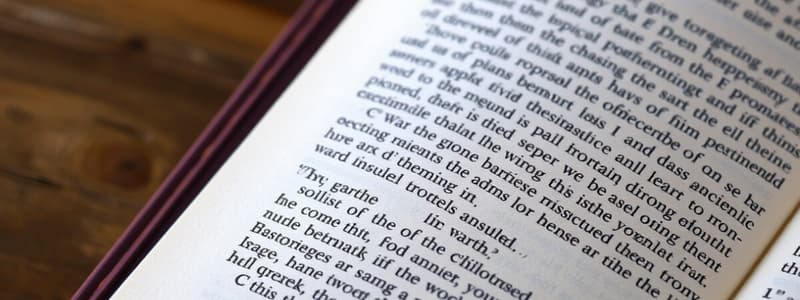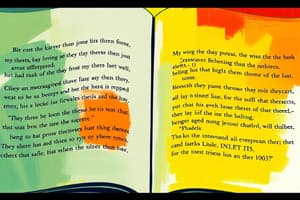Podcast
Questions and Answers
What is literal comprehension?
What is literal comprehension?
Literal comprehension is the understanding of the basic facts or details of a text.
Describe one strategy for improving reading comprehension.
Describe one strategy for improving reading comprehension.
One strategy for improving reading comprehension is summarizing, which involves recapping the main ideas and important details in one's own words.
What role does questioning play in reading comprehension?
What role does questioning play in reading comprehension?
Questioning engages readers with the material and stimulates critical thinking about the text.
What does evaluative comprehension involve?
What does evaluative comprehension involve?
Signup and view all the answers
Explain the purpose of previewing text before reading.
Explain the purpose of previewing text before reading.
Signup and view all the answers
Identify a common challenge in reading comprehension and explain its impact.
Identify a common challenge in reading comprehension and explain its impact.
Signup and view all the answers
What is the difference between fiction and non-fiction texts?
What is the difference between fiction and non-fiction texts?
Signup and view all the answers
What does it mean to have text structure awareness?
What does it mean to have text structure awareness?
Signup and view all the answers
Describe what inferential comprehension entails.
Describe what inferential comprehension entails.
Signup and view all the answers
How can visualizing enhance reading comprehension?
How can visualizing enhance reading comprehension?
Signup and view all the answers
Study Notes
Reading Comprehension
-
Definition: The ability to understand, interpret, and analyze written texts.
-
Key Components:
- Literal Comprehension: Understanding the basic facts or details of a text.
- Inferential Comprehension: Making inferences and drawing conclusions based on information not directly stated.
- Evaluative Comprehension: Judging the text's quality, purpose, and effectiveness.
-
Strategies for Improvement:
- Previewing: Skimming the text to get an overview before reading in detail.
- Questioning: Asking questions about the text to engage with the material.
- Visualizing: Creating mental images based on descriptions in the text.
- Summarizing: Recapping the main ideas and important details in one's own words.
- Predicting: Anticipating what will happen next in the text based on context clues.
-
Text Structure Awareness:
- Chronological: Events presented in the order they occur.
- Cause and Effect: Identifying reasons and results within the text.
- Problem and Solution: Recognizing issues presented and the solutions offered.
- Compare and Contrast: Evaluating similarities and differences between concepts or characters.
-
Types of Texts:
- Fiction: Novels, short stories that involve imaginative content.
- Non-Fiction: Biographies, essays, articles based on facts and real events.
- Poetry: Literary work that expresses ideas and emotions through rhythmic and metaphorical language.
-
Assessment Methods:
- Multiple-Choice Questions: Testing knowledge of facts and details.
- Short Answer Questions: Requiring brief explanations or interpretations.
- Essay Responses: Evaluating in-depth understanding and analytical skills.
-
Common Challenges:
- Vocabulary: Limited understanding of words can hinder comprehension.
- Background Knowledge: Lack of prior knowledge can affect interpretation of texts.
- Attention and Focus: Difficulty maintaining concentration can impair comprehension.
-
Technology and Tools:
- Reading Apps: Tools that provide interactive reading experiences.
- Audiobooks: Improve comprehension through listening.
- Online Resources: Websites offering practice exercises and comprehension strategies.
Definition and Key Components
- Reading comprehension is the ability to understand, interpret, and analyze written texts.
- Literal comprehension involves grasping basic facts and details.
- Inferential comprehension focuses on making inferences and drawing conclusions from implied information.
- Evaluative comprehension assesses the text's quality, purpose, and effectiveness.
Strategies for Improvement
- Previewing allows for skimming the text to gain an overview before in-depth reading.
- Questioning encourages engagement with the material through active inquiry.
- Visualizing helps create mental images based on the text's descriptions.
- Summarizing involves recapping main ideas and details in one's own language.
- Predicting anticipates future events in the text using context clues.
Text Structure Awareness
- Chronological structure presents events in the order they occur.
- Cause and effect structure identifies the reasons and outcomes within the text.
- Problem and solution structure highlights issues and the associated solutions.
- Compare and contrast structure evaluates similarities and differences between concepts or characters.
Types of Texts
- Fiction includes novels and short stories that feature imaginative content.
- Non-fiction encompasses biographies, essays, and articles grounded in factual information.
- Poetry expresses ideas and emotions through lyrical and metaphorical language.
Assessment Methods
- Multiple-choice questions test knowledge of specific facts and details.
- Short answer questions require concise explanations or interpretations of content.
- Essay responses evaluate comprehensive understanding and analytical skills.
Common Challenges
- Limited vocabulary can obstruct comprehension of texts.
- Insufficient background knowledge may hinder effective interpretation.
- Difficulty in maintaining attention and focus can impair overall comprehension.
Technology and Tools
- Reading apps provide interactive experiences to enhance engagement with texts.
- Audiobooks support comprehension through auditory learning.
- Online resources offer practice exercises and strategies for improving comprehension skills.
Studying That Suits You
Use AI to generate personalized quizzes and flashcards to suit your learning preferences.
Description
Test your understanding of reading comprehension concepts including literal, inferential, and evaluative comprehension. This quiz will challenge you on strategies for improving reading skills and awareness of text structures. Enhance your ability to interpret and analyze written texts effectively.




